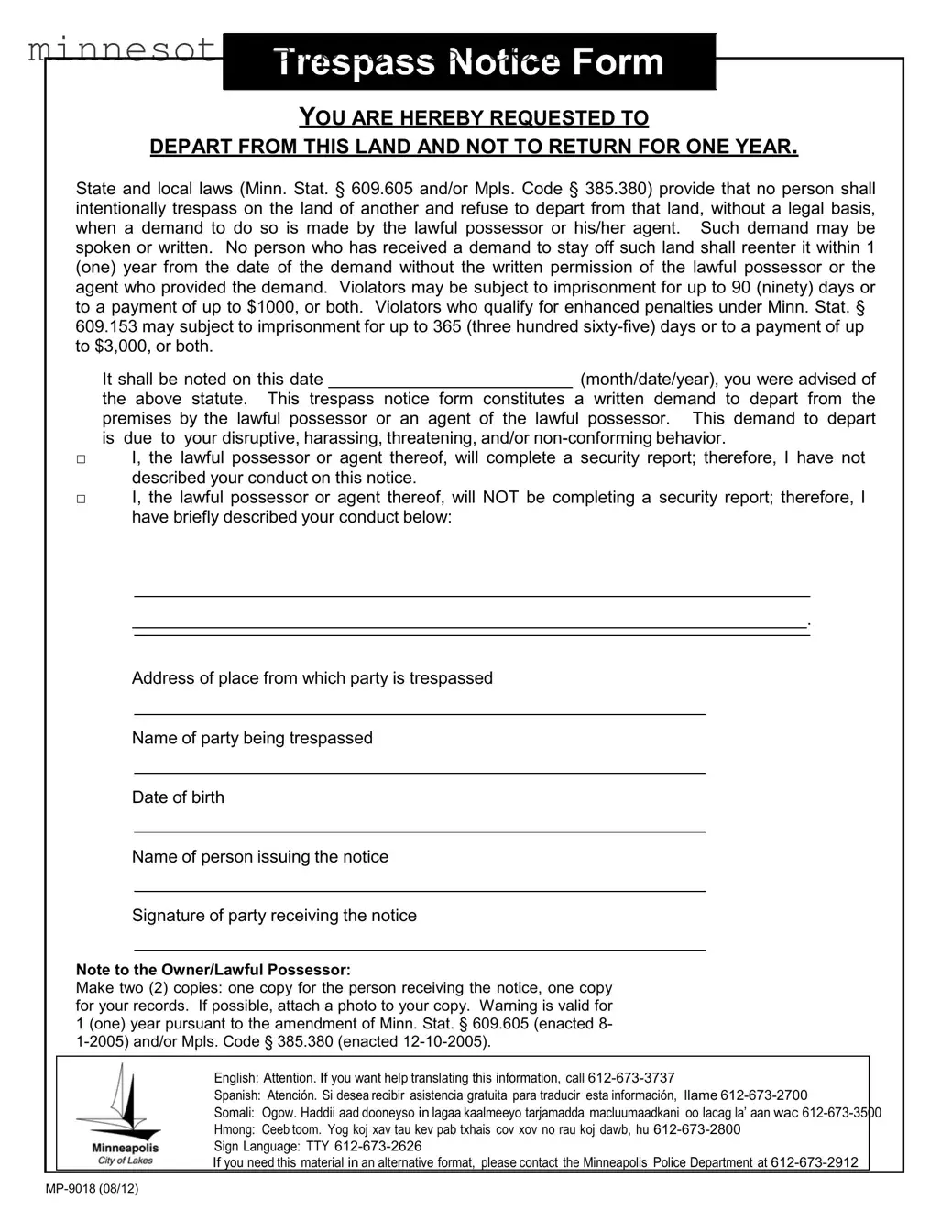Blank Mp 9018 Template
The MP 9018 form, commonly referred to as the Trespass Notice Form, serves a crucial role in maintaining the peace and safety of private property. This document is issued by a lawful possessor or their agent to individuals who are deemed to be trespassing, either through disruptive behavior or failure to comply with property regulations. The form explicitly requests the individual to leave the premises and prohibits their return for a period of one year unless they obtain written permission from the property owner or agent. It is essential to note that trespassing laws, such as Minn. Stat. § 609.605 and Mpls. Code § 385.380, outline the legal implications of ignoring such a notice. Violators may face significant penalties, including imprisonment or fines, depending on the severity of their actions. The form also includes space for documenting the specific conduct that led to the issuance of the notice, although the issuer has the option to file a separate security report if they choose. Additionally, the form provides multilingual assistance for individuals who may need help understanding the notice, ensuring that all community members are informed of their rights and responsibilities. With its structured approach to addressing trespass issues, the MP 9018 form is an essential tool for property owners seeking to protect their rights and maintain a safe environment.
Key takeaways
When dealing with the MP 9018 form, here are some important points to remember:
- The form serves as a trespass notice, requesting an individual to leave a property and not return for one year.
- State laws clearly outline that trespassing is illegal. You must depart if requested by the lawful possessor or their agent.
- Both spoken and written demands are valid. A written notice, like the MP 9018, is often preferred for clarity.
- If you ignore the notice and return to the property within one year, you could face serious consequences.
- Penalties for trespassing can include imprisonment for up to 90 days or fines up to $1,000. Enhanced penalties may apply in certain cases.
- The form requires specific information, such as the address of the property and details about the person being trespassed.
- It is crucial to keep a copy of the notice for your records. Make two copies: one for the individual and one for yourself.
- Consider attaching a photo to your copy of the notice if possible. This can help in future enforcement if needed.
- Translation assistance is available for non-English speakers. Contact the appropriate number listed for help.
Understanding these key points will help ensure proper use of the MP 9018 form and adherence to the law.
Misconceptions
Understanding the Mp 9018 form can be challenging. Here are five common misconceptions about this trespass notice form, along with explanations to clarify them.
- The Mp 9018 form can only be issued by law enforcement. This is not true. Any lawful possessor of the land or their agent can issue the form. It does not require police involvement unless further legal action is needed.
- Receiving a trespass notice means you have committed a crime. A trespass notice is a demand to leave, not a criminal charge. It indicates that the lawful possessor wants you off their property, but it does not automatically mean you will face criminal charges unless you ignore the notice.
- You can return to the property after one year without permission. This is misleading. The notice prohibits reentry for one year without written permission from the lawful possessor or their agent. Ignoring this could lead to legal consequences.
- Only serious offenses can lead to a trespass notice. This is incorrect. A trespass notice can be issued for various reasons, including disruptive or harassing behavior. It is not limited to severe offenses.
- Once you receive the notice, you have no rights. This misconception is false. While the notice demands you leave the property, you still have the right to contest the notice or seek legal advice regarding your situation.
Additional PDF Templates
Self Employment Tax Mn - This form is specifically for organizations filing federal Form 990-T or 1120-C.
This Motor Vehicle Bill of Sale template is a pivotal resource for anyone looking to complete a vehicle transaction in Alabama. By utilizing this document, sellers can ensure all necessary information is accurately recorded while buyers have proof of ownership. For a thorough guide to filling out this important form, refer to our detailed resource on "effective Alabama Motor Vehicle Bill of Sale strategies" here.
Post Office Forms - It also gathers the names of wholesalers that will distribute the products in Minnesota.
Mn Permit to Carry Renewal Online Class - Include your previous residences for the last five years.
